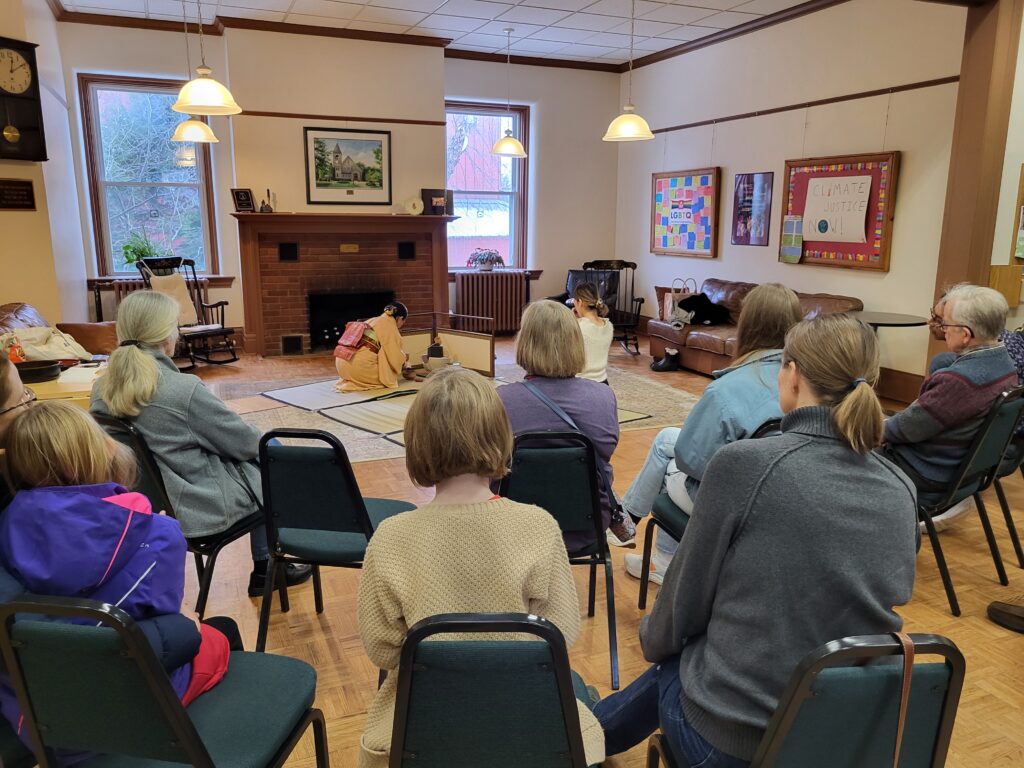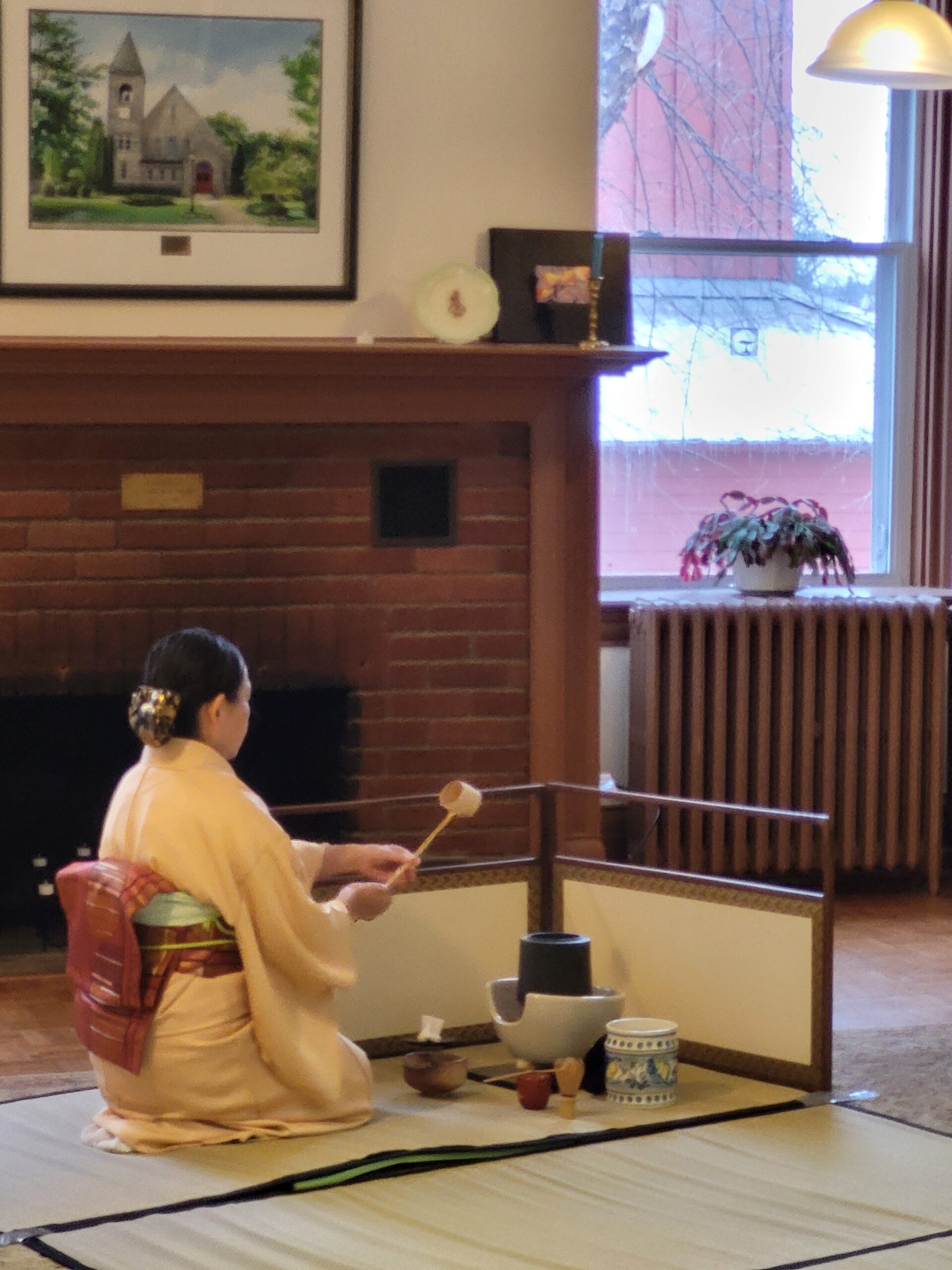We enjoyed a Zen Buddhist Tea Ceremony Demonstration on Saturday, December 7, 2024. The demonstration was presented by Tea Master Kaori MacWilliams of the Omotesenke School.
The Tea Ceremony is a time-honored way of serving matcha. Beyond drinking the tea, the tea ceremony places value on the art of preparing and serving. There are different ways of conducting tea ceremonies based on the school of thought under which the practitioner studied. The three main tea schools in Japan are Urasenke, Mushanokōjisenke, and Omotesenke. The schools trace their lineage back to tea master Sen no Rikyu and the tea schools all have “sen” in their names to honor the tea master.
The Japanese tea ceremony is deeply rooted in Zen Buddhism. Zen concepts and philosophies are integrated into the development of the tea ceremony. The Japanese word ‘Wa Kei Sei Jaku’ represents the four most important elements: harmony, respect, purity, tranquility.
Different Japanese Tea Ceremonies are conducted depending on the time of the day and season. In traditional East Asian calendars, December 7 – 21 is the “taisetsu” season, the word is a combination of the two logographic kanji characters (大雪)meaning, ‘heavy snow’. Taisetsu marks the time of heavy snowfall and it’s when the “Yobanashi no Chaji” tea ceremony is held.
Yobanashi translates to ‘night story. With the sun setting earlier in the December sky, the ceremony is traditionally offered as the tea room is darkening, and so, a candle is lit. With the candlelight as the only illumination, we are free to choose what is important to enjoy in this unique and humbling time with our guests as we prepare for the long nights of the winter.”
The tea ceremony demonstration is part of the year-long World Spiritual Practices Project (WiSPP) grant from the Unitarian Universalist Association funding program (UUFP), which is supporting experiences from a diversity of religious and spiritual perspectives that will be conveyed through workshops, worship, speakers, arts and cultural performances, and programming.

The Japanese tea ceremony is a sacred practice that represents the connection between the sacred and secular, art and life, and earth and inner spirituality. It’s Buddhist influenced. Zen Buddhism is the primary influence on the tea ceremony, and Buddhist monks were the first to introduce tea to Japan. The tea ceremony is a mindful practice that promotes well-being, harmony, and mindfulness.
Just like the martial arts, such as karate, there are several styles of tea ceremonies. As we learned, there are three lines of the Sen family that are Sen no Rikyuu’s descendants. These are Mushakojisenke, Omotesenke, and Urasenke. Our tea ceremony presenter was a student of the Omotesenke school.
Japan has 4 main seasons; spring, autumn, winter, and summer and these seasons contain 24 micro seasons. In the ancient Japanese calendar, there were up to 72 nano seasons. In accordance with the changes observed in the nature and seasonality of plants and foods, the tea ceremony also moves with each season. It’s said there are over 500 kinds of tea ceremonies.
Our tea ceremony was in the 大雪 season, pronounced “taisetsu.” The combination of the two kanji characters means “heavy snow.”
As the name indicates, it’s the season where there is a higher likelihood of heavy snow, (Dec 7th – Dec 21st).
The tea ceremony during taisetsu season is, “Yobanashi no Chaji” (夜咄の茶事). As wr learned, Yobanashi translates to “night story”, and Chaji, means a formal Japanese tea ceremony. It’s a magical and relaxing ceremony; with the sun setting early, the tea room gets dark, and so, a candle is lit. The ceremony is performed in the dark with candlelight as the only illumination of the room.
Similar to our day together, the tea ceremony offers the opportunity to enjoy the long nights of the winter, gather with your guests for a hot cup of tea, and appreciate that they came on a cold, and probably snowy, day.
Also in winter is Akatsuki-no-chaji, which is held on a cold winter morning, often around 4 a.m. If you’re an early riser, you might celebrate your morning tea with a bit of
Akatsuki-no-chaji reflection and rest your mind on the essential elements of the sado (tea ceremony): Wa-Kei-Sei-Jaku, which means harmony, respect, purity, and tranquility.
Here are a few other Japanese seasonal tea ceremonies to know about. By following the calendar, perhaps you can create your own tea rituals in your home, life, and practices.
- Nagori-no-chaji (名残の茶事) – Nagori means the sorrow of parting ways. Before the end of the autumn season in October, right before the Kuchikiri-no-chaji, there is the Nagori-no-chaji to enjoy the last remaining tea leaves from last year’s batch.
- Kuchikiri-no-chaji (口切りの茶事) – Kuchikiri-no-chaji is held when the jars of tea leaves picked in early summer are unsealed and the leaves are ground into matcha. It is the new year of tea and is held every early November. This is the most formal tea event.
- Akatsuki-no-chaji (暁の茶事) – The Akatsuki-no-chaji, or dawn tea ceremony, is held in the early morning of a cold winter day, just as dawn breaks. People walk out of the tea hut to light the traditional lamps in the garden.
- Shoburo (初風炉) – Shoburo is celebrated in May to honor the first use of the furo (風炉 / a portable brazier) every year. The coming of early summer is expressed. The ceremony is long, with lots of speeches, gestures, and formalities.
- Yuuzari-no-chaji (夕ざりの茶事) – Yuuzari-no-chaji is the opposite of Akatsuki-no-chaji. From sun to candlelight, people will drink tea to watch the sunset. It is held at dusk in the summer on a warm day, just as the sun sets.
- Asa-cha (朝茶) – During the summer, Asa-cha is an early cool morning tea ceremony to appreciate the cold surroundings before getting hot. Then, they light the charcoal to heat the tea kettle.
- Uza-ri – During hot and stuffy evenings of June, simplified ceremonies are organized called “uza-ri”.
- Asachi – July and August are the hottest months. Tea ceremonies called “asachi” are held early in the morning, before 6 a.m.
- Yobanashi (夜咄 ) – Yobanashi is an evening tea on a long winter night. Tea drinkers will enjoy the night with garden lanterns and candlelight in the tearoom.
- Chaji (茶事) – A formal tea gathering. Since Chaji is so long, the tea class or lesson is typically broken up into parts for students to practice. The traditional Japanese teaching style encourages them to guide their students rather than only show them tea. They are not only drinking thick tea (koicha 濃茶), but they also eat meals.
- Hatsugama (初釜) – The Hatsugama is the boiling of the first kettle and is typically the only time that a tea host or teacher will make tea for the students, sometimes with a bit of help from some students.
- Chakai (茶会) – Chakai is a Chaji but a small gathering to show hospitality to selected guests. They eat light meals with some sweets. and thin tea (usucha 薄茶).
https://www.japanesegreenteain.com/blogs/green-tea-and-health/10-popular-types-of-japanese-tea-ceremony?srsltid=AfmBOoqAb7PFuj8g4AMCz0JkdL0JfSxaIvbE8ieG_oJ0vSIy2Ka5_3zoAlso, a bit more about the tea ceremony utensils:

